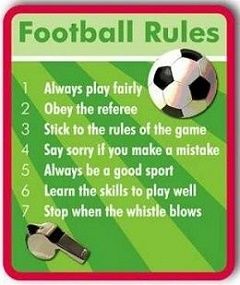FOOTBALL FAQ: There are several ways you can improve your knowledge and understanding about the ‘beautiful game’.
This is a great place to start. We answer all the top questions about football with up-to-date factual content and blog articles.
What are FAQs?
FAQs are ‘frequently’ referred to as the five (5) ‘Ws’. They comprise who, what, when, where, and why? Often, ‘H’ (how?) takes an inclusion as the sixth and occasionally you will see a seventh (how much?).
Each query phrase gets regarded as a pertinent question whose answer cannot be a simple ‘yes’ or ‘no’. As a rule, learning the answers to these FAQs is the most basic fundamental in problem-solving and information-gathering.
So, let’s kick off with some of the most basic questions and answers about soccer history and regulation:
What is Football?
The term ‘football’ describes various forms of a team game which mostly involves kicking a ball. Players use a round-shaped football ball in the English Premier League game. That’s one reason why we call it football in the United Kingdom (and soccer in America).
Note: Beginners can avoid getting left back in the dressing room with the top 10 rules for football game. The simple guide explains the most important regulations in English soccer.
What Constitutes a Foul in Football?
As a rule, a football foul would be an unfair act committed by a player which interferes with active play. A match referee would decide on the foul while officiating the game’s laws.
There are different outcomes that punish soccer fouls. The referee can award either a direct or an indirect free-kick (depending on the offence). In some cases, a foul in football results in a penalty spot kick awarded to the opposing team.
Is a Handball a ‘Direct’ or ‘Indirect’ Kick?
As a rule, a direct kick occurs following a contact foul or hand ball. Most other football infringements are indirect.
If a defending team commits a contact foul or hand ball within their own penalty area (a marked out box at each end of the field) – the result is a penalty kick.
What is a Penalty in Football?
In FIFA Football, a penalty kick is a unique version of the direct free kick. It takes place during normal play (as opposed to a shootout). A penalty kicker shoots the ball from the penalty mark which is a spot located 12 yards (11 metres) from the goal line.
How Can I become a Referee?
To become a Football Association (FA) referee you need to be at least 14-years-old and a resident in England. Contact your County FA for further information.
Note: You would need to attend a Basic Referees Course with your local County FA to train as a qualified referee.
What Does the Referee Do?
 In a game of soccer, the referee is the appointed person of authority on the field for the players. Football referee responsibilities include presiding over the game and officiating with a neutral point of view. The chief role centers around making ‘on-the-fly’ decisions. A football referee must enforce all the rules of infringements and sanctions in the sport while maintaining fairness and safety.
In a game of soccer, the referee is the appointed person of authority on the field for the players. Football referee responsibilities include presiding over the game and officiating with a neutral point of view. The chief role centers around making ‘on-the-fly’ decisions. A football referee must enforce all the rules of infringements and sanctions in the sport while maintaining fairness and safety.
Get even more soccer questions and answers on…
Deliberate Handball Rule in Football
Football Referee Caution Cards
Kicking (and netting) Football Penalties
Soccer Back Pass to Goalie Rule
What are the Regulations of Football?
The Fédération Internationale de Football Association rules football. Their headquarters were first founded in 1904 in Switzerland.
They currently have over 200 members around the world. FIFA governs all the rules and regulations of football as played in the English Premier League, United Kingdom.
What is the Role of the Fourth Official in Football?
The main role of the Fourth Official in football is assisting the referee in his control of the match. All the officials should do so under the FIFA Football Laws of the Game
The 4th Official would officiate if any of the other three match officials (referee or assistant referees) are unable to continue to administer the rules and regulations.
How Many Players are there in a Football Team?
Two teams of eleven (11) players are usually involved in a typical game of regulation football. It is worth noting that a variety of player formations get used in different competitions. For example, there are some variances in Premiership, League and in European matches.
In 11-a-side games, there must be at least seven (7) players. The rules allow for three (3) substitutes from the 7 available. But, their names must get nominated before the game begins.
How Long can a Goalkeeper Hold the Ball with his Hands?
Since the recent changes in FIFA Football Rules, referees now have some extra mandatory instructions. They must not allow the goalkeeper to take more than four (4) steps while holding the ball. This regulation is a stipulation of FIFA Law 12 in the codified FA rulings.
What happens if a goalie holds the ball for more than 5 or 6 seconds? It can get adjudged as time-wasting by the official. As a rule, it will result in an indirect free kick to the opponents.
What are the New Rules for 2022?
IFAB introduced twelve new football rules for the 2019/20 season. They include changes to the handball rule and sterner punishments for an ‘illegal’ goal celebration.
The official Laws of the Game 2022 PDF contains 228 pages. Check out a summarisation of 12 new FIFA rule changes brought into play from the 1st of June.

